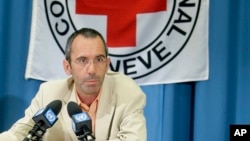The International Committee of the Red Cross says millions of people in Africa who are facing violence, hunger and displacement are in desperate need of assistance. The humanitarian group is appealing to the international community for more help.
International Committee of the Red Cross Operations Director Dominik Stillhart just visited the Central African Republic, South Sudan, and Somalia. He says these conflict-ridden countries are in desperate need of more international support.
He says the humanitarian situation in CAR is serious, with thousands of civilians killed in fighting between Muslim Seleka rebels and Christian anti-Balaka fighters. Stillhart says most of the more than 500,000 internally displaced people are too scared to return home.
He says he does not believe the fighting is based on religious differences. Nevertheless, it has resulted in a de facto division of the country between the Muslim Seleka controlled northeast and the government and Christian anti-Balaka in the southwest.
Stillhart tells VOA the best hope for overcoming divisions in the country lies in mutual interest in having a stronger economy.
“Economically, it would make a lot of sense to work together again because, especially the Muslim populations and communities, they were the main traders of the country and Bangui is suffering from the absence of that trade community. So, there may be some economic incentives for people to start living together again, which will then gradually ease some of the tensions, the serious tensions that now exist in the country,” he said.
Forty percent of ICRC's operational budget goes toward Africa. South Sudan costs about $139 million and the ICRC has appealed for an additional $19 million, mainly to provide food for 150,000 people until the end of the year. It has provided food to more than one half million people since December.
But the United Nations reports nearly four million people in South Sudan are in need of food aid. Stillhart says it is too early to speak about famine.
“We will see probably at the end of the rainy season when access will be improving whether we can really speak about famine," he said. "We know there are pockets of serious food insecurity, but there is also a large-scale humanitarian operation that is underway and that may well prevent the worst from happening, but the situation is critical."
Stillhart says the situation in the Somali capital Mogadishu has improved, but in areas under the control of al-Shabab militants the situation is dire. He says of the 2.9 million people in need of food, one million internally displaced in Somalis are most at risk.




